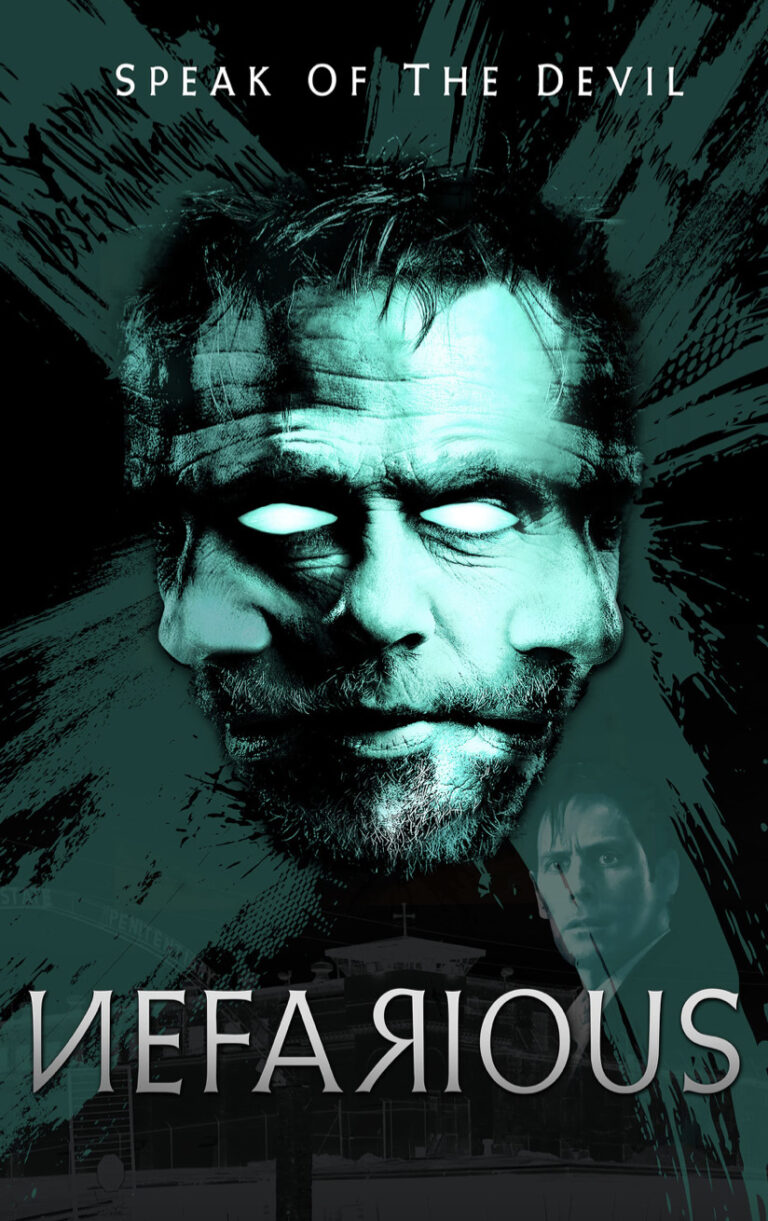
Synopsis : On the day of his scheduled execution, a convicted serial killer gets a psychiatric evaluation during which he claims he is a demon, and further claims that before their time is over, the psychiatrist will commit three murders of his own.
Rating: R (Disturbing Violent Content)
Genre: Horror, Mystery & thriller
Original Language: English
Director: Cary Solomon, Chuck Konzelman
Producer: Chris Jones, Cary Solomon, Chuck Konzelman, Sheila Hart
Writer: Cary Solomon, Chuck Konzelman
Release Date (Theaters): Limited
- Runtime:
- Distributor: Soli Deo Gloria Releasing
- Production Co: Believe Entertainment
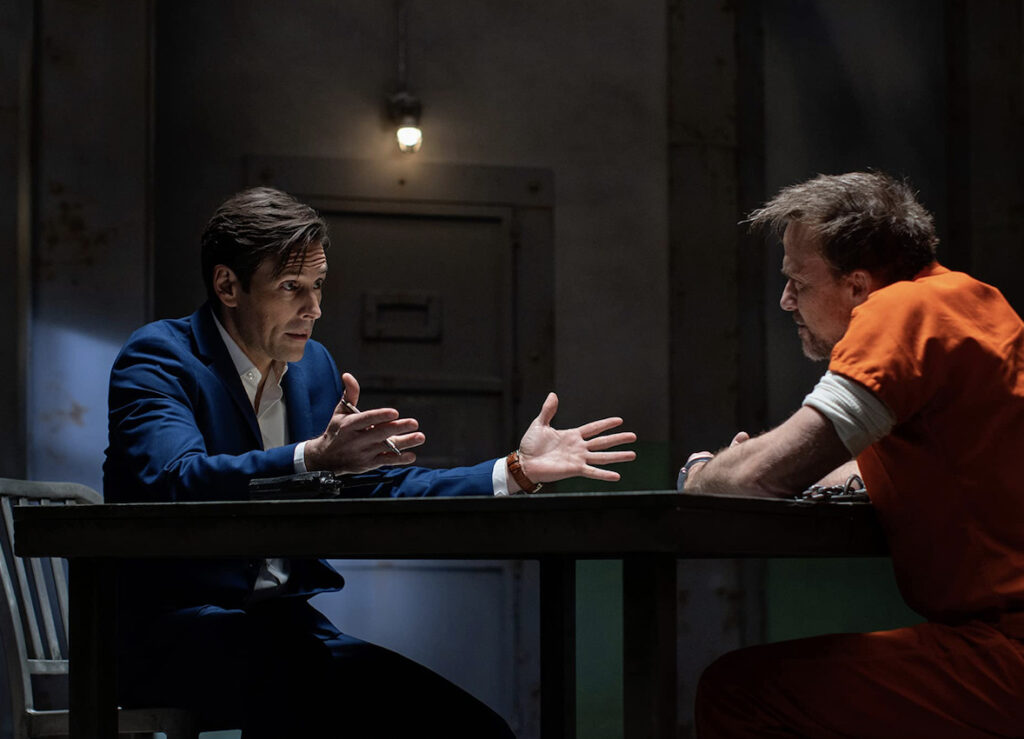
Q : You were originally born in Louisiana and moved to Texas when you were a child and learned all those martial arts when you were nine years old. But how did you choose an acting career? What did you choose to do in Hollywood?
SPF: I was going to the University of St. Thomas and saw the most beautiful girl I’d ever seen at the time leaving a building. I decided to find out what was in that building. What was so special that made her go into it every Monday? It ended up being the theater department. I did what any red-blooded Texan does. I went to business affairs and dropped an English class so I could sign up for whatever they taught in that building. And that’s what got me into theater. By the time I graduated, I had written a piece of children’s theater. I wanted to drive out to Los Angeles and produce that play. I did plays all during college after I got into the theater department and fell in love with acting. But I really moved out to LA to be a writer.
Q : What happened with that girlfriend? Did you get in touch with her and How did that affect your acting career?
SPH: I did speak to her, but that’s a long story for another day.
Q : There was some time between you landing a role in “The Young Indiana Jones Chronicles” in 1994, and starting your career. How did you survive as an actor back then? What kind of jobs did you do to make ends meet back then?
SPH: When I first got out to LA, I had written a piece for children’s theater as I had said. I wanted to rent a playhouse and produce the play. But I waited tables at a restaurant called TGI Fridays. People act like it was a horrible job but I loved it. I had a ball doing it. I met different people every day. I used to do part-time jobs when I first got here. It’s everything that you learn about in the restaurant industry, you can apply to the film industry, how you react to people, how you talk to them and all those things. You adapt those elements in your life in some way.
A waiting job or something like that was super valuable to me. I did that for, I guess, about a year and a half, maybe two years before I got Young Indiana Jones. I got on a plane and went to England to start shooting. Look, a good work ethic is a good work ethic. In any occupation, you get your currency in a number of different areas. One is money, but the enjoyment and interpersonal interactions are another. My currency is a quality of life thing.
The people that I’m working with, the conditions that I’m working in, as well as the money, you have to make enough. But really, the key word is enough. As far as money, you just need enough. You don’t need to chase a number, you just need enough. And you can achieve that one of two ways. You can either increase what you earn or reduce what you need and I was always very good at reducing what I need. so I’ve had a number of different jobs throughout my life and I’ve really enjoyed all of them.
Q: What was your first impression of the script for your new film Nefarious. It mostly takes place pretty much in a jail cell and relies on your acting skills. What was your impression of the script when you first read it?
SPF: I knew when I drove out to LA to become an actor, that there were some gold standard scripts. This script is why I drove out to Los Angeles. Another one is a film that I did way back in the ‘90s called “Powder.” When I read that script, I thought, “Wow, this is the role of a lifetime.” And now with “Nefarious,” when I read it, I said, “Whoever gets to play this role, to me, it’s the role of a lifetime.”
You do a lot of films to pay your mortgage. There are the ones that you move away from home and find a roommate on Craigslist in hopes that one day you’ll get that A-list script that is better than anything you’ve read before. Chuck [Konzelman] and Cary [Solomon] are two of the best writers I have ever come across in the industry. It’s rare that I read a script that I wouldn’t change a single syllable. They wrote that in “Nefarious.” They knocked that script out of the park.
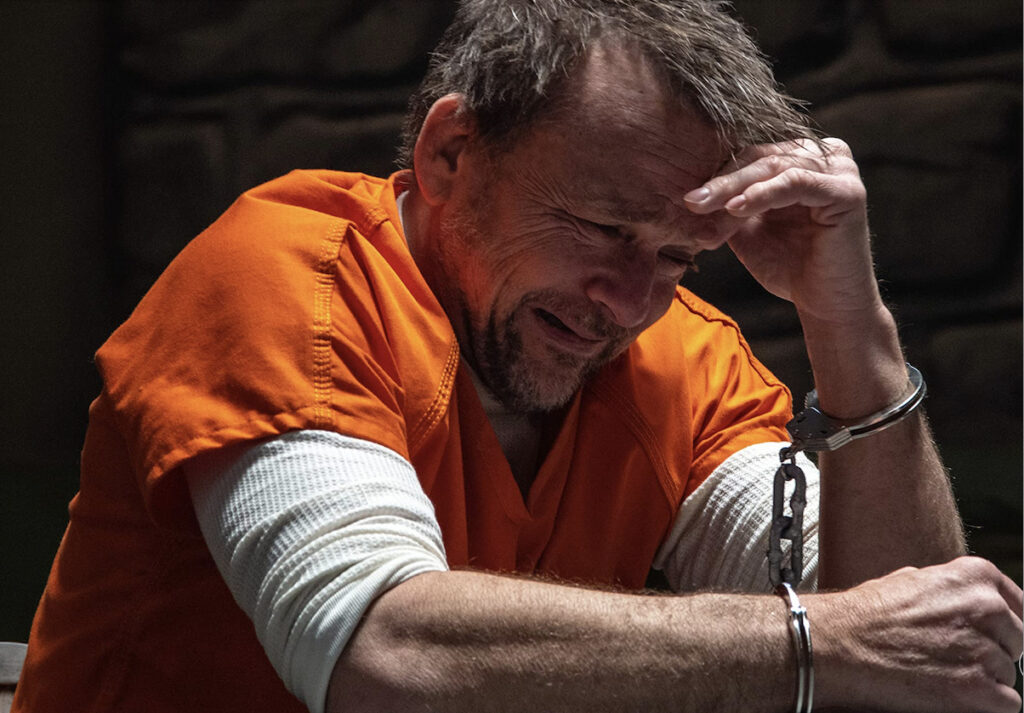
Q: The film very much focuses on your character and on Dr. James Martin played by wonderful actor Jordan Belfi. There’s a collaboration that needs to be on the set. What kind of conversation did you have with Jordan prior to shooting?
SPF: One of my biggest concerns in signing on to do “Nefarious” was who was going to sit on the other side of the table with me. I conveyed all of my opinions and Chuck and Kerry kept me in the loop with everybody that they were considering. We all agreed that Jordan was more qualified, but I never spoke to Jordan until I saw him in the hotel two days prior to shooting. Chuck and Kerry made an amazing decision.
I thought he was incredible in that role, the perfect counterpoint to me playing Nefarious. I wouldn’t want to do it with anybody else across the table. We made an educated guess with the information that was available to us, and they hired him. The casting of Jordan was a stroke of genius. This film was co-written and co-directed by Chuck and Kerry, who had grown up next door to each other.
Q: How do they work on the set? How did they divide the tasks on the set?
SPF: They are like brothers. They finish each other’s sentences. One will stop and just nod as if he was telling the other person what to say. It’s amazing to watch. It’s very rare that they disagree on anything. It is like working with one director. I’ve never seen anything like it. There’s no competition. Neither one contests the other. They both complement each other in ways that are highly unlikely of two men. It’s the second film I’ve done with them.
At the culmination of the first film that we’d shot, I told them, I said, guys, you are two of my favorites and I would do a Froot Loops commercial with you. That’s how much I loved working with them. And then 15 years later, they called and said, “Hey, we have a Froot Loops commercial, it’s called “Nefarious” — you want to do it?” And so, I mean, I can’t speak more highly of Chuck and Kerry. They are two of the most wonderful human beings, but also some the best writers I have ever worked with, period. They’re so talented, that is for me personally unparalleled in this industry.
Q: You came to Hollywood to try to become a writer rather than an actor initially. You did also write the book, A Champion, Frank and Penalty. When you have a film like this, which very much relies on the dialogue, how much input do you give to the director? Did you change any dialogue in the scene?
SPF Well, to be honest, nine times out of 10, I change every word that leaves my mouth. But not in this film. I’m not kidding. In this film, I think I adjusted two words. That’s it. Everything else that I say, they wrote down. These are their words. That’s how good their writing is. I read it and thought this is one of the best scripts. No, it’s probably the best script I’ve ever read and I got an opportunity to do it and that doesn’t really happen. I changed hardly anything because it didn’t need to be changed.
Q : Your character Edward Wayne Brady is a master manipulator, a serial killer who murdered six people. What kind of research did you do to play this role? Particularly how he moves, how he giggles and his mannerisms, did you take after any serial killer? What kind of research did you do to master those characteristics?
SPF: Talking about the acting process. I know other actors who have a large, intricate procedure that they go through mentally and physically. I don’t have that. All of my research takes place in reading the script. If the script is good enough, it is like an instruction manual on how to create a character. Everything that I did was on the page.
When I read it, I thought, “Okay, what would the mannerisms of this type of person be?” I just made choices and did it. I didn’t put myself through torture, I just read the script and I believed every word and started to think of the way that he would speak. What expressions would he make? What would the cadence of his speech be? I just made choices like that. I can’t make it more simple than that when it’s on the page. It’s easy.
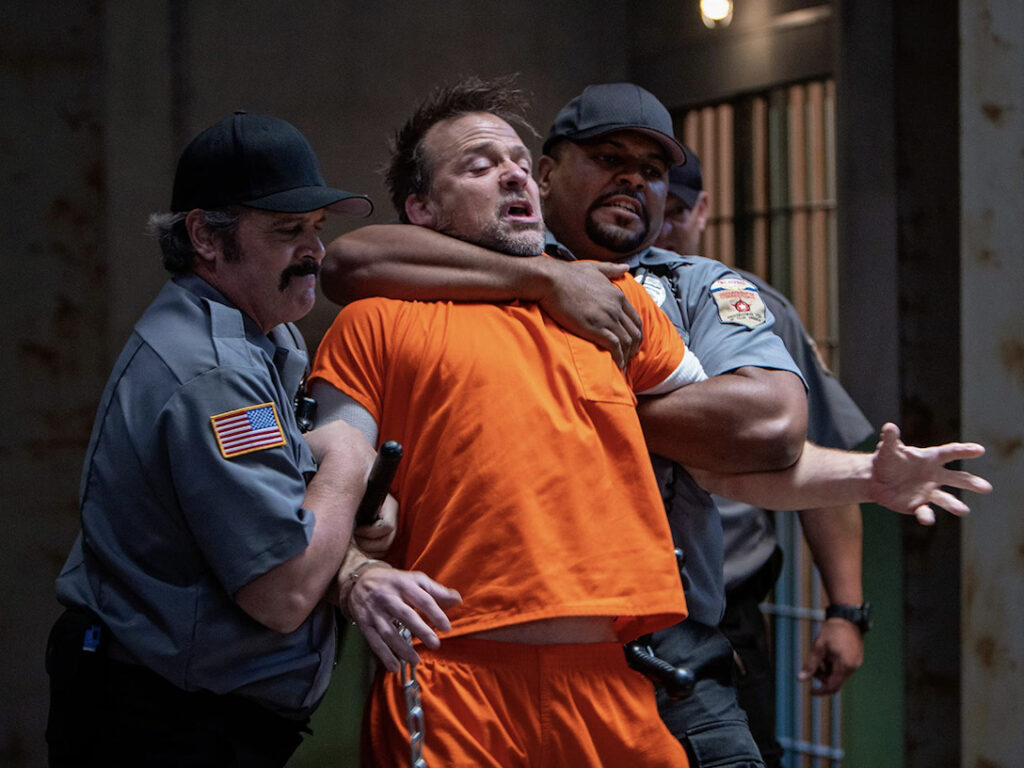
Q: This movie relies on playing the mind game throughout the film. How do you keep the tension throughout the film? It’s already written in the script, but how do you manage to keep those tensions when you’re in a confined room throughout the film? What kind of approach do you use as an actor?
SPF: You know, now you’re talking about editing. My job is to design puzzle pieces. The editor’s job is to assemble, whittle down and put them together. And I thought the editor did an outstanding job. Because when people say, whoa, there are just two people at a table talking for an hour, and they put it on the actor, oh my God, you’re amazing.
Realistically, you know who is amazing? It’s the editor who kept you interested with only having been given eight shots of two faces from different angles. And somehow he managed to make it engaging and important and exciting.That is all editing. So That is all editing.
Q : Your action-acting kept the tension throughout the film as well.Throughout your career, you’ve done a lot of action films. You got into Taekwondo and learned Muay Thai and Brazilian Jiu-Jitsu and Karate. Have you ever thought about pursuing your acting career in other countries? You could succeed in other countries such as Japan.
SPF: I’m open to doing good films wherever they are. But I’ve never been approached to do a foreign film. I would love to. I am a big fan of the entire Japanese culture. I think America could learn a lot through Japanese culture. When I first traveled to Tokyo in the ‘90s and saw a soda machine, it dispensed beer. It was on the subway and I thought, wait a minute.
Any 10 year old could go and buy liquor? And they looked at me like I was crazy. They said, no, underage you can’t buy beer. I said, “Yeah, but anybody with a coin can get it.” They said, “Nobody would ever do that.” I thought, “Oh my God, it’s on the honor system.” In the United States, not only would minors buy beer, they would steal the machine. I have to tell you, theJapanese are doing something very, very right in their culture. It’s something that Americans could learn from.
Q: That’s an interesting perspective. But let’s talk about your future project — another “Boondocks Saints.”
SPF: We’re in the process of assembling the moving pieces together right there’s about five yards to go before the finish line. But if we achieve those five yards — which it looks like we will — then there’s a good probability that the public could have a Boondock 3 in the near future. We’re in the final stages of assembling all the parts. This is something that me and [Norman] Reedus have been really passionate about for a long time. I’ve known Reed’s since 95, even before we did the film. He’s one of my closest friends in the industry and we really look forward to doing part three and having it better than part one.
Q: All the cast members back. How will the directors go in a different direction? It’s really great to hear that it’s finally happening.
SPF: We still have five yards to go, but it looks like we’ll get there.
Q : This is a really intriguing psycho-thriller. What do you want an audience to take away from this film Nefarious?
SPF: You know, as an actor, I like the films. Like when me and my wife, before we had kids, we’d go to the movie theater. We loved going to eat after and talking about the film. Now if it wasn’t a good film, that conversation lasts five minutes. If it was a great film, sometimes it’d last for two or three days. I wanted to start a conversation that lasts a couple of days, if not weeks or months. I love the idea of providing a different perspective. People make their own decisions. I don’t have some secret motive with this film. I do feel strongly about this film and I certainly hope that it affects people. Maybe it changes some hearts and minds for the better.
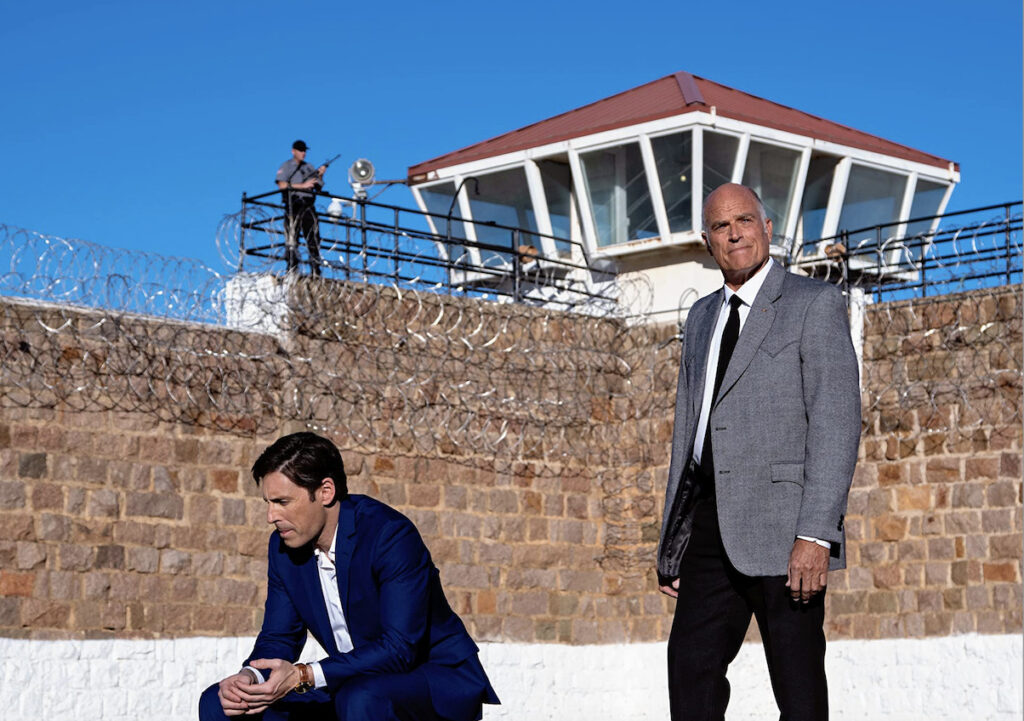
Check out more of Nobuhiro’s articles.
Here’s the trailer of the film.

